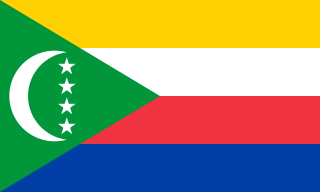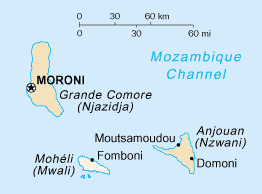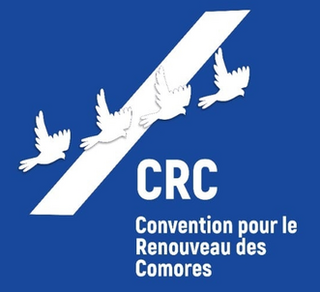 |
|---|
|
Parliamentary elections were held in the Comoros on 18 April 2004, with a second round on 25 April. [1] The result was a victory for the Camp of the Autonomous Islands, which won 12 of the 18 elected seats.
 |
|---|
|
Parliamentary elections were held in the Comoros on 18 April 2004, with a second round on 25 April. [1] The result was a victory for the Camp of the Autonomous Islands, which won 12 of the 18 elected seats.
Following the previous elections in 1996, a political crisis had led to Anjouan and Mohéli seeking to secede from the Union. A 1999 coup led to Azali Assoumani taking power. A new constitution was introduced in 2001, decentralising power by granting autonomy to the three islands. Azali subsequently won presidential elections in 2002, which were boycotted by the opposition. [1]
At the time of the elections, only 18 of the 33 members of the Assembly of the Union were directly elected in single-member constituencies. The remaining 15 were chosen by the legislatures of the three islands, Anjouan, Mohéli and Grande Comore, with each island electing five members.
The direct elections were held in 18 single-member constituencies using the two-round system.
In 2004 there was only one national political party, the Convention for the Renewal of the Comoros led by Assoumani, which favoured more centralised government. Prior to the elections a loose coalition, the Camp of the Autonomous Islands, was formed by opposition groups organised by the presidents of the three islands.
| Party | First round | Second round | Total seats | +/– | |||||
|---|---|---|---|---|---|---|---|---|---|
| Votes | % | Seats | Votes | % | Seats | ||||
| Camp of the Autonomous Islands | 8 | 4 | 12 | New | |||||
| Convention for the Renewal of the Comoros | 2 | 4 | 6 | New | |||||
| Indirectly-elected members | 15 | – | |||||||
| Total | 10 | 8 | 33 | –10 | |||||
| Source: IPU | |||||||||
All fifteen of the indirectly-elected seats were won by the Camp of the Autonomous Islands. [2]

The Comoros, officially the Union of the Comoros, is an archipelagic country made up of three islands in Southeastern Africa, located at the northern end of the Mozambique Channel in the Indian Ocean. Its capital and largest city is Moroni. The religion of the majority of the population, and the official state religion, is Sunni Islam. Comoros proclaimed its independence from France on 6 July 1975. The Comoros is the only country of the Arab League which is entirely in the Southern Hemisphere. It is a member state of the African Union, the Organisation internationale de la Francophonie, the Organisation of Islamic Co-operation, and the Indian Ocean Commission. The country has three official languages: Shikomori, French and Arabic.
The history of the Comoros extends back to about 800–1000 AD when the archipelago was first inhabited. The Comoros have been inhabited by various groups and sultanates throughout this time. France colonised the islands in the 19th century, and they became independent in 1975.

The Politics of the Union of the Comoros take place in a framework of a unitary presidential republic, whereby the President of the Comoros is both head of state and head of government, and of a multi-party system. Executive power is exercised by the government. Legislative power is vested in both the government and parliament. The precolonial legacies of the sultanates linger while the political situation in Comoros has been extremely fluid since the country's independence in 1975, subject to the volatility of coups and political insurrection.

Anjouan is an autonomous volcanic island in the Comoro Islands in the southwestern Indian Ocean, part of the Union of the Comoros. It is known in Shikomori as Ndzuani, Ndzuwani or Nzwani, and, until the early twentieth century when the name fell out of general use, in English as Johanna. Historically it was also called Hinzuan or Hanzoan.

Azali Assoumani is a Comorian politician and military officer who has served as the President of the Comoros from 2002 to 2006 and again since 2016, except for a brief period in 2019. He became head of state after staging a coup d'état in 1999 and was elected president in 2002, 2016, 2019 and 2024. He also served as Chairperson of the African Union from February 2023 to February 2024. Assoumani's current presidency has been described as increasingly authoritarian.

Mohéli, also known as Mwali, is an autonomously-governed island that forms part of the Union of the Comoros. It is the smallest of the three major islands in the country. It is located in the Indian Ocean off the coast of Africa and it is the smallest of the four major Comoro Islands. Its capital and largest city is Fomboni.

Elections in the Comoros take place within the framework of a multi-party democracy and a presidential system. The President and the majority of the seats in the Assembly of the Union are directly elected.

The Convention for the Renewal of the Comoros is a political party in the Comoros.

The Assembly of the Autonomous Island of Anjouan is the island's legislative body.

The Assembly of the Autonomous Island of Grande Comore is the island's legislative body.

The Assembly of the Autonomous Island of Mohéli is the island's legislative body.

Presidential elections were held in the Comoros on 16 April and 14 May 2006. As it was the turn of the island of Anjouan to hold the union presidency, a primary election was held in Anjouan on 16 April, prior to a national election on 14 May. The result was a victory for Ahmed Abdallah Mohamed Sambi, who received 58% of the vote in the national election.

Parliamentary elections were held in the Comoros on 6 December 2009, with a second round on 20 December. The elections were originally scheduled for July 2009, but were postponed until after a constitutional referendum was held in May 2009. They were then scheduled to take place on 29 November, but were delayed again. The result was a victory for the Baobab Movement, a coalition supporting President Ahmed Abdallah Mohamed Sambi.

Presidential elections were held in the Comoros on 21 February 2016, with a second round to be held on 10 April 2016, alongside elections for the Governors of the three islands. A re-run of the second round was held in thirteen constituencies on Anjouan on 11 May. Azali Assoumani of the Convention for the Renewal of the Comoros was elected President with 41% of the vote.

The National Rally for Development was a political party in the Comoros.

Early presidential elections were held in the Comoros on 24 March 2019 alongside regional elections. A second round would have been held on 21 April if required, but incumbent President Azali Assoumani was re-elected in the first round of voting.

Parliamentary elections were held in the Comoros on 19 January 2020; in constituencies where no candidate received a majority, a second round was held alongside local elections on 23 February. The elections were boycotted by the main opposition parties, including the two largest parties in the outgoing Assembly, the Union for the Development of the Comoros and Juwa Party, in protest at constitutional reform and political repression, The result was a landslide victory for President Azali Assoumani's Convention for the Renewal of the Comoros, which won 20 of the 24 elected seats.
Said Ali Kemal was a Comorian politician. He was the son of Prince Saïd Ibrahim Ben Ali and the grandson of Sultan Said Ali bin Said Omar of Grande Comore.

Presidential elections were held in the Comoros on 14 January 2024. Election officials initially announced on 16 January that incumbent president Azali Assoumani had been re-elected with 63% of the vote, with a voter turnout of just 16%. However, the Supreme Court approved a set of results that showed Assoumani receiving 57% of the vote, with voter turnout at 56%.
The 1999 Comorian coup d'état was a two-day long bloodless military takeover in the Comoros led by Colonel Azali Assoumani from April 29 to April 30, resulting in the overthrow of interim president Tadjidine Ben Said Massonde. The coup was ostensibly carried out to restore order and prevent further attacks on Anjouanese residents in Grande Comore amid the country's secession crisis involving the islands of Anjouan and Mohéli.